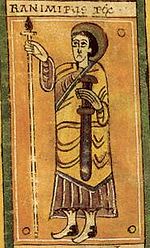Battle of Estercuel
| Battle of Estercuel | |||||||
|---|---|---|---|---|---|---|---|
| Part of the Reconquista | |||||||
 Contemporary miniature of Ramiro of Viguera (Ranimirus rex, "king Ramiro", according to the superscription), bearing the sword and holding a sceptre, from the Codex Vigilanus |
|||||||
|
|||||||
| Belligerents | |||||||
| Kingdom of Viguera | Caliphate of Córdoba | ||||||
| Commanders and leaders | |||||||
| Ramiro Garcés of Viguera | al-Tuyibi | ||||||
| Strength | |||||||
| 500 cavalry | superior | ||||||
| Casualties and losses | |||||||
| 33 men | few if any | ||||||
The Battle of Estercuel took place on 6 July 975 between the forces of the Kingdom of Viguera, under king Ramiro Garcés, and those of the Caliphate of Córdoba, under the kaid of Zaragoza, al-Tuyibi. The battle, a typical skirmish of the Christian–Muslim frontier, was a victory for the Caliphate. Several leading Navarrese magnates were killed and Ramiro was injured.
The kaid of Zaragoza had been a participant in the campaign of Galib ibn Abd al-Rahman in the spring, but he appears to have left the expedition before the victory at the Battle of San Esteban de Gormaz in 978. The forces of the Kingdom of Pamplona, under Sancho II Garcés Abarca, Ramiro's half-brother, were also engaged at Gormaz, where they were defeated alongside the Castilians under García Fernández. The kaid was on the road to Zaragoza when he encountered a Christian army under Ramiro Garcés. The chief source for the encounter is the Muqtabis of Ibn Hayyan, whose account of these years is derived directly from the so-called Anales palatinos ("palatine annals") of Isa ibn Ahmad-Razi:
. . . upon separating from the army [of Galib] on Tuesday, 22 Sawall [5/6 July], he [al-Tuyibi] ran into the train of the pig Ramiro ibn Sancho, and he followed said train, sending to tell the chief of the advance posts about the mountain Bárdena, on the other side of the river Ebro: "Carefully keep watch for a large troop of cavalry that, at dawn, will cross in the direction of the river". In effect, little time passed before the alarm was given that the enemy had appeared beside the town of Estercuel (a half a day's ride from the city of Tudela, on the royal road that comes up from Zaragoza) and before some Christian cavalry forces had scattered throughout the region, to the right and to the left, in the manner of a raid, and were going about seizing whatever booty they encountered and taking captive five men who were out fishing in those valleys.
...
Wikipedia
